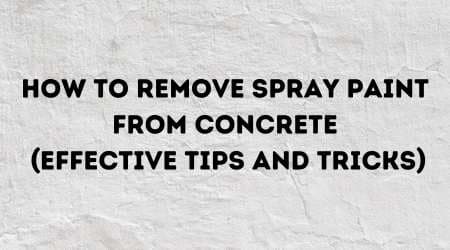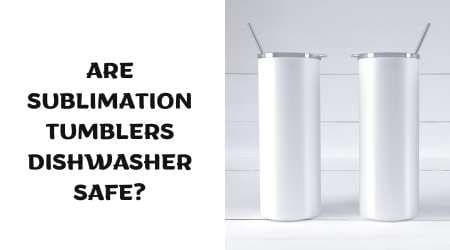
Removing spray paint from concrete requires using a solvent-based cleaner and a stiff-bristled brush. Spray paint on concrete is an eyesore and can diminish the curb appeal of your property.
However, using the right technique, you can quickly and easily get rid of it. Removing spray paint from concrete requires specific cleaning products and tools. Regular soap and water won't remove it entirely. You need to use a solvent-based cleaner and a stiff-bristled brush to scrub away the paint.
In this article, we'll discuss in detail how to remove spray paint from concrete effectively and with ease. With this guide, you'll be able to tackle the task head-on.
Methods For Removing Spray Paint From Concrete
If you're dealing with a spray-painted concrete surface, you are not alone. Spray paint can be challenging to remove. However, various methods can effectively remove spray paint from concrete surfaces. Here are some tried and tested methods for removing spray paint from concrete.
Chemical Solvents
Chemical solvents are an effective way to remove spray paint from concrete. Different solvents are available in the market, but you need to make sure that the solvent you choose is safe for use on concrete.
- Always wear protective gear before using chemical solvents, like gloves, goggles, and a mask.
- Apply the solvent to the affected area and wait for it to loosen the paint.
- Use a scraper or a scrub brush to remove the paint carefully.
- Follow the manufacturer's instructions for best results.
Pressure Washing
Pressure washing is a powerful method of removing spray paint from concrete surfaces.
- Make sure the pressure washer is suitable for use on concrete surfaces.
- Always wear protective gear when using a pressure washer.
- Direct the spray towards the affected area, using a back and forth motion to remove the paint.
- Use a high-pressure setting for best results.
Sandblasting
Sandblasting is an aggressive method of removing spray paint from concrete surfaces. It involves the use of a high-powered machine to blast sand onto the painted area.
- Sandblasting can be a hazardous process. Always wear protective gear when sandblasting.
- Only use sandblasting if other methods have failed.
- Hire a professional contractor to perform sandblasting to avoid damage to your concrete surface.
Heat Treatment
Heat treatment is an effective method of removing spray paint from concrete surfaces. It involves using a heat gun or a blow torch to soften the paint, making it easier to scrape off.
- Always wear protective gear when using a heat gun or a blow torch.
- Hold the heat gun or blow torch approximately 6 inches away from the painted surface.
- Use a scraper to remove the paint carefully.
- Use a heat gun or a blow torch with caution, as they can cause damage to your concrete surface.
Natural Remedies
Natural remedies are a safe and eco-friendly method of removing spray paint from concrete surfaces. They are a good option if you want to avoid using chemical solvents on your concrete.
- Use a mixture of baking soda and water to form a paste. Apply the paste to the painted area and leave it to dry. Scrub the paste off with a brush to remove the paint.
- Apply vinegar to the painted area, and let it sit for 30 minutes. Scrub the area with a brush to remove the paint.
- Rub a mixture of lemon juice and cornstarch onto the painted area. Leave it to dry, and then scrub it off with a brush.
Removing spray paint from concrete can be a challenging task, but with the right method, it can be done. Choose the method that works best for you, keeping in mind the safety precautions and potential damage that each method can cause.
You Can Also Read: Can You Spray Paint Leather? – Complete Guide
Evaluating The Effectiveness Of Various Techniques
Factors To Consider Before Choosing A Technique
When it comes to removing spray paint from concrete, not all techniques are created equal.
- The type and age of the spray paint stain: Depending on the type of paint and how long it has been on the concrete, different techniques may be more effective than others.
- The location and size of the stain: A small, isolated stain may require a different technique than a large, widespread stain. Additionally, stains in high-traffic areas may require techniques that are less likely to damage the concrete.
- The tools and supplies required: Some techniques may require specialized tools or supplies that are not readily available.
- Your own skill level and comfort with the technique: Some techniques require more skill and expertise than others. It's important to choose a technique that you feel comfortable using.
Cost Vs. Effectiveness Comparison
There are several different techniques for removing spray paint from concrete, each with its own advantages and disadvantages. Here is a cost vs.
- Pressure washing: Pressure washing is an effective way to remove spray paint from concrete, but it can be expensive if you don't already own a pressure washer. Additionally, it can be difficult to control the pressure and avoid damaging the concrete.
- Chemical solvents: Chemical solvents are a cost-effective solution for removing spray paint, but they can also be harmful to the environment and require proper disposal.
- Sandblasting: Sandblasting is a highly effective technique for removing spray paint, but it can also be expensive and can damage the concrete if not done correctly.
- Soda blasting: Soda blasting is a gentler alternative to sandblasting that uses baking soda to remove the paint. It is less likely to damage the concrete but may not be as effective on stubborn stains.
- Mechanical grinding: Mechanical grinding uses a grinding machine to remove the paint from the concrete. It is effective and can be done by a professional or a skilled diyer, but it can also be expensive.
Best Scenario For Each Technique
Here are the best scenarios for each of the above-mentioned techniques:
- Pressure washing: This technique works best for smaller spray paint stains, or stains that are in an easily accessible area. It is also a good option if you already own a pressure washer.
- Chemical solvents: Chemical solvents are best for larger, more widespread stains that are not easily removed by other methods. They are also a cost-effective option for diyers on a tight budget.
- Sandblasting: Sandblasting is an effective technique for removing stubborn spray paint stains from concrete walls or floors. It is best left to professionals who have experience with this technique, as it can cause damage if not done correctly.
- Soda blasting: Soda blasting is a good option for removing spray paint from delicate surfaces, as it is gentler than sandblasting. It may not be as effective on stubborn stains, but it is a safer option for diyers.
- Mechanical grinding: Mechanical grinding is a good option for removing spray paint from concrete floors, especially in large areas where other methods may not be efficient. It is also a good option for diyers who have experience with this technique.
Prevention Methods
How To Remove Spray Paint From Concrete: Prevention Methods
Concrete is known for its durability, which is why it is one of the most commonly used building materials worldwide. More often than not, it is utilized in areas with high traffic, making it susceptible to graffiti. If you have been a victim of unwanted spray paint on your concrete surfaces, don't panic because removing graffiti on concrete is not impossible.
Protective Coatings
Protective coatings, when applied correctly, can help protect your concrete surfaces from graffiti.
- Sacrificial anti-graffiti coatings: This coating is applied on top of the paint or sealer, which means that when someone puts graffiti on your concrete surface, the top layer gets removed easily without damaging the underlying paint or concrete.
- Semi-permanent anti-graffiti coatings: This type of coating is ideal for surfaces that are frequently exposed to graffiti. It creates a protective barrier that makes the surface easy to clean.
Obstacles And Common Pitfalls
Sometimes, preventing graffiti is as simple as making it difficult for vandals to access your concrete surfaces.
- Increase visibility: Vandals are less likely to graffiti your property if the surfaces are well lit and visible to the public.
- Plant shrubs: Planting shrubs or bushes in front of your property's walls can act as a physical barrier, making it difficult for vandals to reach and apply spray paint.
- Surveillance cameras: Installing surveillance cameras around your property can deter vandals from spraying graffiti.
Despite your best efforts, graffiti can still be difficult to prevent.
- Not acting quickly to remove graffiti after it has been sprayed: The longer the spray paint is left on the concrete surface, the harder it is to remove it.
- Using the incorrect cleaning solution: Using the wrong cleaning solution can further damage the concrete surface. Always check the label before using any cleaning solution.
- Using abrasive cleaning methods: Abrasive cleaning methods can damage the concrete's surface, leaving it rough and uneven.
Prevention is always better than cure when it comes to graffiti. Applying protective coatings, creating obstacles, and watching out for common pitfalls can help keep your concrete surfaces graffiti-free.
Frequently Asked Questions Of How To Remove Spray Paint From Concrete
What Is Spray Paint And How Does It Stick To Concrete?
Spray paint is a type of aerosol paint that's used for graffiti and other types of painting jobs. It sticks to the surface of concrete because of its adhesive quality which adheres it to the concrete surface.
What Are The Common Methods Of Removing Spray Paint From Concrete?
There are several ways to remove spray paint from concrete, including using solvents, power washing, and sandblasting. Other options include using chemical paint removers or applying a sealant to the concrete surface to prevent further staining.
How Do You Remove Spray Paint Using Household Items?
You can also remove spray paint from concrete using household items such as baking soda, vinegar, and dish soap. Simply create a cleaning solution with these ingredients and apply it to the affected area with a brush, and then scrub away the paint with a wire brush or scraper.
Is It Possible To Prevent Spray Paint From Sticking To Concrete?
Yes, it is possible to prevent spray paint from sticking to concrete. Applying a coat of sealer or wax to the concrete surface can help to repel paint and prevent it from adhering to the surface. This will make it easier to remove any future paint stains.
How Long Does It Take To Remove Spray Paint From Concrete?
The time it takes to remove spray paint from concrete will depend on the size of the affected area and the method you use. Some methods can take several hours or even days to complete, while other methods can remove the paint in just a few minutes.
It's best to consult a professional for advice on which method is right for you.
Conclusion
Removing spray paint from concrete can be a challenging task, but it is not impossible. You can use various eco-friendly and cost-effective methods to remove spray paint from concrete. From simple solutions like using a power washer, sandblaster, or just using a scrub brush with soap and water, there are a variety of options available.
You don't have to spend a lot of money to restore the look of your concrete surfaces. However, before you decide on a method, it's essential first to identify the type of paint used, or it could lead to further damage to the concrete's surface.
With the tips and tricks mentioned in this blog post, you can make your concrete surfaces clean and new again. Remember, patience and persistence are key when it comes to removing spray paint from concrete.





